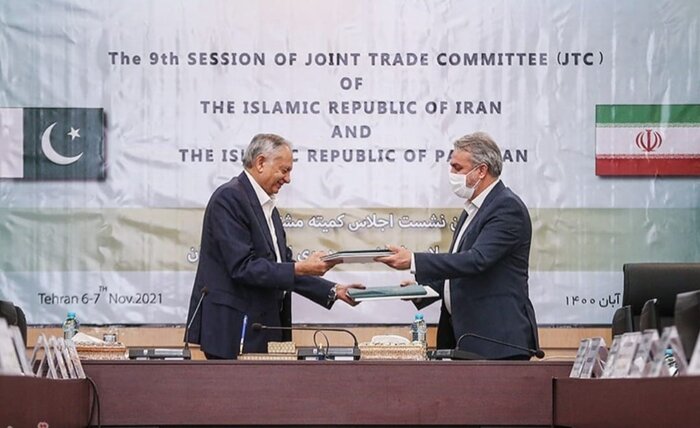Iranian Minister of Industry, Mines and Trade Reza Fatemi Amin and Advisor to Prime Minister of Pakistan for Commerce and Investment Abdul Razak Dawood co-chaired the meeting held in Tehran on Saturday and Sunday.
Both sides during the meeting have agreed to increase the bilateral trade volume to $ 5 billion. Iran also expressed readiness to cooperate with Pakistan in home appliances and dairy products. Most importantly, the implementation of a Free Trade Agreement (FTA) between Iran and Pakistan within the next three months was also agreed.
The Pakistani side also stressed the desire to continue using Iran's land routes for the development of transit transport, and this matter was raised during meetings between the Pakistani Prime Minister's Advisor and Iranian Minister of Roads and Urban Development Rostam Ghasemi and Minister of Agriculture Jihad Seyyed Javad Sadati Nejad.
Meanwhile, Pakistani media has given wide coverage to 9th meeting of Iran-Pakistan Joint Trade Committee and the visit of Advisor to Prime Minister of Pakistan for Commerce and Investment Abdul Razak Dawood to Iran.
Media in their reports said the visit would help to strengthen business activities between Iran and Pakistan more effectively including setting up a system for barter trade.
Although the lack of a banking channel is a major challenge for Iran-Pakistan trade but barter trade mechanism could enhance bilateral trade and chambers of commerce of the two countries could expand trade cooperation without exchanging money.
An economic Pakistani newspaper Business Recorder while reporting the visit of Advisor to Prime Minister of Pakistan for Commerce and Investment Abdul Razak Dawood to Iran said that the efforts of the two neighbors show that both are sincere in implementing the barter trade system.
The paper reported Abdul Razak Dawood in a tweet said he is happy to announce the conclusion of the meeting of Joint Trade Committee today between Pakistan and Iran, in which both the countries have agreed on barter trade-in rice, construction of border markets, movement of Pakistani trucks under TIR, and Customs cooperation.
The paper quoting sources said it had been decided in the meetings that that a barter trade mechanism would be established between Quetta and Zahedan Chambers of Commerce.
Referring to the fears of State bank of Pakistan’s fears about the consequences of violating US anti-Iran sanctions, which are considered to be the main reason for the lack of a banking channel between the two neighboring countries, Business Recorder added Pakistan has shared a list of 33 items including rice, fresh or dried guavas, mangoes, meat,, surgical goods, woven fabrics or jute, plastic and articles (polymers or styrene), textile fabrics etc.
Iran has shared a list of 33 items of its interest including gaseous hydrocarbons, liquefied gas, sacks and bags, fresh and dried dates, ceramic flags and paving & finishing ceramics; dried leguminous vegetables (chickpeas garbanzos); fresh and dried pistachios, bars and rods of iron or non-alloy steel, fruit juices, milk and cream, containing added sugar or other sweetening matter.
Pakistani sources said that Mirjavah-Taftan joint border crossing will be the main route for barter trade between Iran and Pakistan, and that this process will be carried out under the supervision of the two countries' financial and banking institutions, customs and the active presence of Quetta and Zahedan chambers.
**Increased border crossings to strengthen barer trade
Pakistan's English-language Dawn newspaper, referring to the two-day visit of Abdul Razak Dawood to Iran and the ninth meeting of Joint Trade Committee said the lack of banking channel is an obstacle to promoting joint trade.
"Due to the long border between Iran and Pakistan, which is more than 950 km, with the increase of border crossings, trade relations can be accelerated, including by using the purification mechanism," the report said.
Pakistani media while covering the meetings of the Prime Minister's advisor in Tehran with Iranian officials and the agreements reached to remove the trade obstacles, wrote: Iran and Pakistan are determined to increase the volume of joint trade to $ 5 billion and for this important implementation the Free Trade Agreement (FTA) between the two neighbors will be implemented within the next three months.
**Signing of a memorandum between Quetta and Zahedan chambers
The Pakistani TV Samaa also reported that the business community of neighboring provinces of Iran and Pakistan will make tireless efforts to strengthen cooperation, and in this regard, barter trade agreement is a turning point in achieving bilateral trade goals.
During the meeting of the Iran-Pakistan Joint Trade Committee, a Memorandum of Understanding was signed between the Quetta Chamber of Commerce and Industry and the Zahedan Chamber of Commerce in the presence of Fida Hossein Dashti and Mohammad Ayouf Mariani, Chairman and Vice President of the Quetta Chamber.
The Federation of Chambers of Commerce and Industry of Pakistan, has welcomed the new stage in Tehran-Islamabad trade cooperation, emphasizing the need for a constructive approach of the Pakistani government, including the State Bank to help achieve common business goals.
Criticizing the ineffective approach of his country's central bank, the head of the Pakistani Chamber of Commerce called for help in promoting Pakistan's barter trade with Iran, as well as Europe, China and India, which trade with the Islamic Republic despite sanctions and other international issues.
Therefore, instead of wasting more time, it is better for the two countries to enter the operational phase of trade agreements, and this is what the high-ranking officials of the Islamic Republic of Iran and the business community of the two neighboring countries emphasize.
272**7129
Follow us on Twitter @IrnaEnglish
